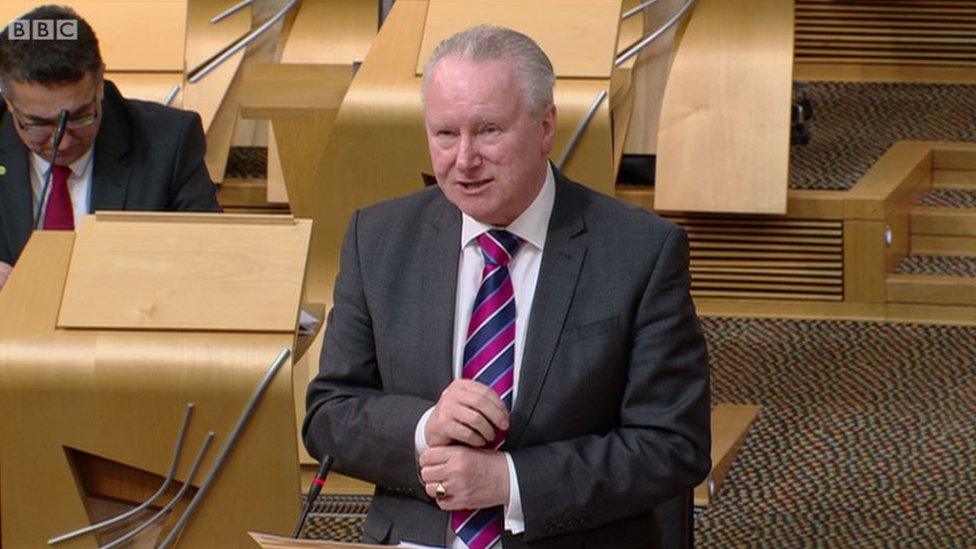Scottish government to set up new welfare delivery agency
- Published
Holyrood will be responsible for 11 benefits when powers are devolved from Westminster to Holyrood
The Scottish government is to set up a new agency to deliver social security payments when new powers are devolved.
Holyrood is to be given control over 11 benefits under the Scotland Bill - including support for carers and those with disabilities.
It will also be given the ability to top-up existing payments and create new benefits.
Social Justice Secretary Alex Neil has led a Holyrood debate on the new welfare powers.
The new devolved benefits, which are said to be worth about £2.7bn every year, include the Carer's Allowance and benefits for the disabled such as the Disability Living Allowance.
Mr Neil said the devolved benefits would be run by a new Scottish welfare agency, and has promised that payments will be made in full and on time.
He said he wants to remove the stigma attached to claiming benefits, and to show that social security can be "fairer, tackle inequalities, and protect and support the vulnerable in our society."
Mr Neil said the new powers represented a "real opportunity to transform the service people receive".
He said: "Our new Scottish social security agency will be the flagship organisation that oversees the delivery of benefits in Scotland.
"It will be underpinned by our commitment to principles that will treat people with dignity and respect. We want to take a fairer approach to social security that tackles inequalities.
"Our immediate priority is to make sure there is a smooth transfer of these benefits and that households continue to receive them on time and in the right amount."

Alex Neil said the new powers represented "a real opportunity to transform the service"
The Scottish government has already confirmed it will increase Carer's Allowance to the same rate as Jobseeker's Allowance once it receives the powers, and that the so-called Bedroom Tax will be scrapped in Scotland.
On Monday, Scottish Labour unveiled its own welfare proposals, with party leader Kezia Dugdale pledging to "grasp with both hands" the possibilities provided by the new powers.
Her proposals included:
ensuring that children leaving care and going into higher education receive a full grant
the abolition of the so-called bedroom tax using new powers over Universal Credit
raising the Carer's Allowance to the same level as Jobseeker's Allowance
doubling the Sure Start maternity grant, increasing its value to £1,030.
Ms Dugdale said that the Scottish Parliament's new powers meant the election on 5 May would be about "tax and spend" issues rather than the constitution.
'Benefits stampede'
Leading for Labour in the chamber, Neil Findlay said the Scottish government should see addressing child poverty as their number one priority of the new agency.
He argued that this could only be delivered by using new financial powers to increase the revenues available to Holyrood.
The Scottish Conservatives have warned against creating a "benefits stampede" when the new powers come into effect.
During the Holyrood debate, Tory MSP John Lamont said the future delivery of social security should "always encourage the benefits of the workplace", albeit with an emphasis on dignity and respect.
He said welfare policy choices should be made with fairness to Scotland's taxpayers in mind, calling for a low-welfare, high-work society with measures to prevent people abusing the system.

Kezia Dugdale, Ruth Davidson and First Minister Nicola Sturgeon all want to increase the Carers' Allowance when Holyrood is given the power
Party leader Ruth Davidson - who supports increasing the Carers' Allowance - said the welfare system should provide a safety net, but one which also helps people back into work, which she said was always the best route out of poverty.
And she said all political parties need to be sure there is a fair balance between helping people who support, as well as the taxpayers who fund it.
Scottish Lib Dem leader Willie Rennie told his party's spring conference on Friday that he would put forward a "big, bold agenda" for change in the run-up to the election on 5 May.
During the debate he said he agreed with the government's priorities and stressed the importance of getting the "foundations" of the new system right.
He said both he and his wife had relied on the social security system in the past, noting that anyone may need it at any time, but said there would not be any "stampede" into Scotland for these benefits.